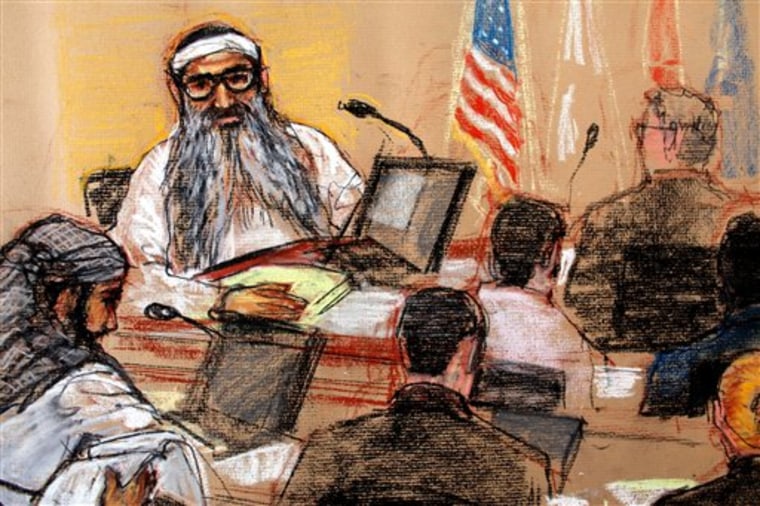Two of the five men accused of orchestrating the Sept. 11 attacks offered unapologetic admissions of guilt Monday in a sometimes chaotic — and possibly final — session of the Guantanamo war crimes court.
The hearings, scheduled over several days, could be the last at Guantanamo, since President-elect Barack Obama has said he would close the offshore prison at the U.S. base in Cuba and many expect him to suspend the military tribunals and order new trials in the U.S.
Ramzi Binalshibh and Khalid Sheikh Mohammed, the self-proclaimed architect of the terrorist attacks, casually admitted guilt during a series of outbursts as the translators struggled to keep up and the judge repeatedly sought to regain control.
"We did what we did; we're proud of Sept. 11," Binalshibh announced at one point in proceedings that dealt with a number of legal issues, including whether he is mentally competent to stand trial on charges that carry a potential death sentence.
Mohammed, who is representing himself, switched back and forth between Arabic and English, insisting at one point that a uniformed military lawyer assigned to assist him be removed from his defense table. The man, he said, represents the "people who tortured me," he said.
Mohammed shrugged off the potential death sentence he faces for charges that include the murder of nearly 3,000 people in the Sept. 11 attacks.
"We don't care about capital punishment," he said. "We are doing jihad for the cause of God."
Told by the judge to limit his remarks to the subject at hand, Mohammed bristled: "This is terrorism, not court. You don't give me the opportunity to talk."
Canadian also in court
In a separate hearing, a judge was holding pretrial hearings in the case of Canadian Omar Khadr, who is accused of killing a U.S. soldier, Sgt. 1st Class Christopher Speer of Albuquerque, New Mexico, with a grenade during a battle in Afghanistan in 2002 when the Toronto native was 15.
Khadr's lawyers are seeking to have statements he made to interrogators excluded from his trial, arguing they were obtained through torture and coercion.
A prosecution witness, a woman identified only as "interrogator 11" characterized the interrogations as "lighthearted."
"He always came in smiling and very willing to talk to us," she testified.
In both cases, the judges were considering whether the Pentagon must charge and arraign the men all over again after it withdrew and refiled charges in about 20 cases. The Pentagon described the refiling as a procedural step required to appoint new military jury panel members.
The judges sided with the prosecutors and ruled the cases would not have to start anew.
One judge, Army Col. Stephen Henley, acknowledged doubts about the future of the hearings, saying one legal matter could be addressed "at later sessions, if later sessions are scheduled."
Lawyers and representatives of human rights groups who came to observe the hearings believe Obama will suspend the military commission system created by Congress and President George W. Bush in 2006 to prosecute dozens of men held at Guantanamo.
"This system is discredited and flawed and should not exist one day more, and certainly the signals that we hear from Washington, from the Obama transition team, are that he will act on it as soon as he is in office," said Jamil Dakwar, a lawyer with the American Civil Liberties Union who is in Guantanamo this week to observe the hearings.
'Different course' likely?
Obama's nominee for attorney general, Eric Holder, in his confirmation hearing echoed a major criticism of the commissions: that they lack sufficient legal protections for those charged. He said the detainees could be tried in the United States.
Those statements make it unlikely that the commission system will go forward, said Navy Lt. Cmdr. Bill Kuebler, Khadr's Pentagon-appointed lawyer.
"It is simply unimaginable to think that these proceedings would continue when you have an administration that is on the record saying that so clearly," Kuebler said. "What's very clear ... is that they want to take a different course of action on Guantanamo."
The Pentagon's chief war crimes prosecutor, Army Col. Lawrence Morris, said he did not know what the Obama administration would do and had to plan as if the commissions would go forward. Still, prosecutors joined with the defense in asking military judges to postpone this week's hearings until after the inauguration. The judges rejected the request.
More on the
